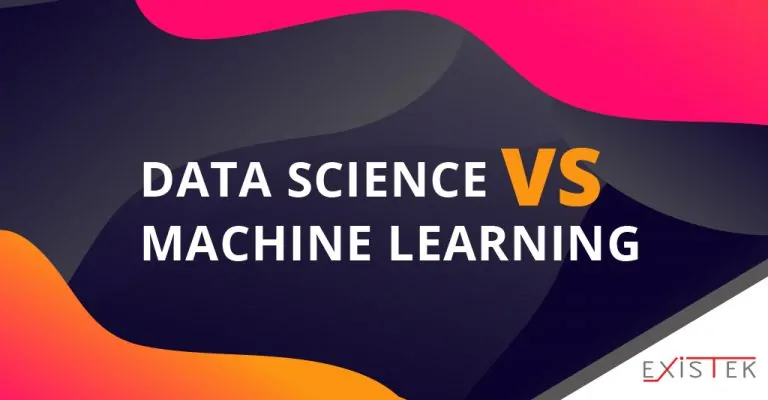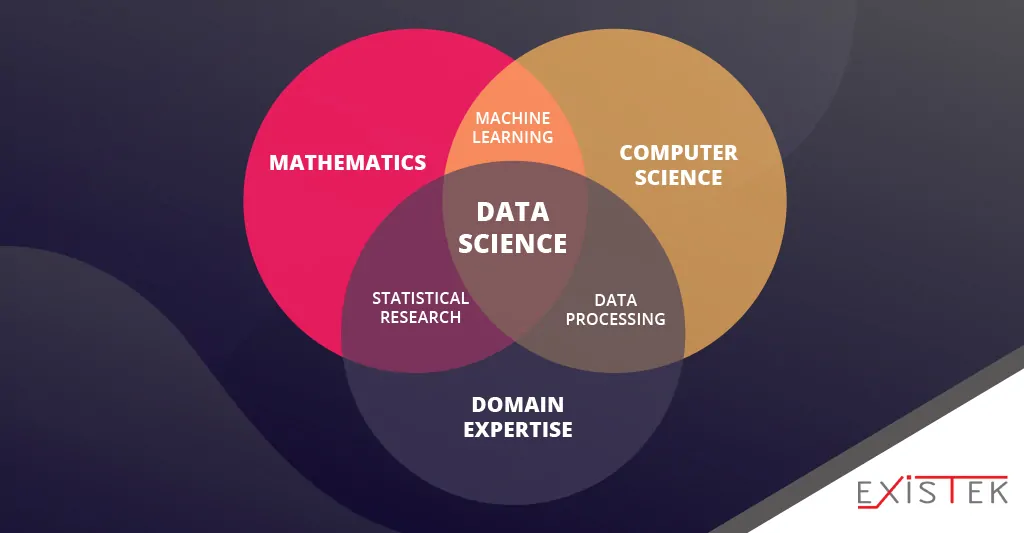
July 11, 2019
A lot of concepts closely related and usually interconnected to each other might even cause certain confusion. In this article, we would like to light upon data science vs machine learning, in particular, give the definition of each concept and find out their interactions and difference.
It goes without saying that data has become the most valuable business asset. Year after year, scientists and corporations use more and more data for analysis and predictions. Data science has never been used so globally. AT&T uses it to analyze network usage in different areas, while Amazon analyzes how age impacts the color of the phone case customers are likely to purchase. We hear “data science” in regard to such concepts as machine learning, business intelligence, predictive analysis, deep learning, AI, and dozens of others. But how all of those are working together?
List of the Contents
Data science is the field covering scientific approaches to processing and structuring data in order to extract knowledge. This is a broader term that unifies different techniques for collecting data for various organizations, businesses, and governments. In short, it applies methods and approaches from mathematics, computer science, statistics, and information science. Whereas machine learning is the usage of computer algorithms for analyzing the data, learning from it, and making future conclusions. As for the techniques, it usually employs regression and supervised clustering. Both data science and machine learning deal with structured and unstructured data. However, the first one focuses on the entire data processing theory, while machine learning concentrates on the performance of the algorithms. Therefore data science is a broader concept for multiple subjects and machine learning happens to be one of its subdivisions. Let us take a look at each of them more closely.
WHAT IS DATA SCIENCE
As the amount of data considerably grows, the main difficulty is not storage anymore but the right ways of processing and receiving the most value from it. A lot of scientists direct their attention toward this pressing issue. Therefore data science is a special approach that applies a number of processes for describing, predicting, interfering, and extracting insights from huge data amounts. It is an inter-discipline that processes data by connecting various theories and techniques. The main task is to find productive solutions by applying capable hardware, simple and complex systems as well as data science algorithms. The concept relies on creatively unifying different expertise such as mathematics, technical, and business skills.
Firstly, the quantitative techniques used in mathematics help to find solutions for data utilization. It enables data insights and the creation of data products. The most data is expressed mathematically through its texture, dimension, and correlation. Understanding structural models facilitates finding solutions. Data science for business deals not only with statistics but analytical functions as well. Knowledge of linear algebra is required for data science algorithms and inferential methods.
Secondly, technology is an inevitable part of the overall process. Data scientists apply digital tools to organize a huge amount of data, handle complex tasks and ease the process flows. Their technical skills are critical as it concentrates on building, recomposing, and finally receiving the final products. Python, R, SQL, and SAS are the common programming languages used for coding. In short, data scientists have to be capable of complexity and finding cohesive approaches.
Thirdly, data scientists should acquire excellent business skills. Applying mathematical and technical expertise, they are determined to learn from it, share observations, and make contributions. This makes them good business assistants. The business value is formed by comprehension and interaction of all the approaches. Therefore data science for business is a valuable tool to guide the process and provide business consultations.
Finally, this approach has been applied to many industries and enabled insights and data product development over the years. Combining data preparation, statistics, prediction models, and machine learning, specialists have resolved a lot of problems and found reasonable solutions for such fields as marketing, healthcare, agriculture, social science, education, etc. Data scientists meet the challenges of increasing demands for new solutions.
WHAT IS MACHINE LEARNING
Machine learning is closely related to data science as it is responsible for making solutions and applying the same toolbox. It is all about putting algorithms into practical use. Machine learning is the usage of data science algorithms for analyzing data, learning from it, and making future conclusions. The methods cover the different types of data modeling for making predictions and defining the data patterns algorithmically. Those models apply the training data that automatically makes predictions and decisions as there is no need to perform the tasks in order to predict the unknown one. They learn from the already performed steps, however, only in a certain set of tasks. It cannot recognize the context or abstractions, but it can learn from its own experience with time.
This is the advanced kind of AI that does not require constant human assistance; nevertheless, their guidance is necessary when making advanced decisions beyond the common functions. Those are the training of predictive models and new pattern introduction. The longer machine performs certain tasks, the more observations and “experience” it can apply for prediction. In addition, the machine obtains knowledge both from supervised and unsupervised learning and collaborating with human assistants. In this case, the data scientists are those who will choose the required tools and give commands to perform the following steps in different situations.
Machine learning will not exist without data science as long as it applies data science algorithms and techniques for its performance. The theory and methods used here are delivered from a mathematical study of optimization, predictive analytics, computational statistics, etc. Machine learning is a great option to reproduce patterns and make the most of its experience. The algorithms perform automatically, while human specialists concentrate on the better and harder solution. Machine learning experts should obtain programming, data modeling, and evaluation skills as well as have knowledge of statistics and Probability theory.
Furthermore, it is time-saving as machine learning analyzes and delivers valuable solutions faster. It takes less time for the machine to create the data analyzing model than the human experts do it manually. As a result, this approach has proved its efficiency through AI and human cooperation. It has greatly contributed to different spheres and easier processing and analyzing the data. It is used in web search, advertising, marketing, data security, healthcare, fraud detection, image and speech recognition, financial services, etc. The interest in machine learning is constantly growing as long as it opens new opportunities for its users.
DATA SCIENCE VS MACHINE LEARNING
After checking both approaches separately, we can come to the point that data science is a broader concept that unites multiple disciplines, whereas machine learning is one of those concepts that use data science. Data science is responsible for the implementation of numerous processes to guarantee overall data performance. Machine learning concentrates on data science algorithms’ performance and can be determined as one of the processes that data science applies in its complex functionality. Data science does not only depend on mechanical processes; it includes data engineering, architecture, integration, visualization, and prediction, which help to find business value solutions.
Therefore, despite their differences, concepts are closely related and dependent on each other. In particular, we should emphasize the cooperation of data scientists and machine learning experts. On the one hand, the first ones determine machine learning methods, create the data science algorithms and prepare them for testing. Only after that the machine learning experts are ready to apply the prototyped models and make them perform in the right way. They have to comprehend the provided models and work on mastering their future functionalities. On the other hand, machine learning experts provide the data scientists with the data preparation and analysis, and what’s more, the already made decisions. In short, the data science process of finding solutions greatly relies on machine learning, and their collaboration is an inevitable stage for receiving the final results.
Today good specialists in both approaches are highly-demanded on the market. Combining the right types of expertise will be beneficial for different industries and businesses that are interested in developing valuable data products. When there is a choice “data science vs machine learning”, the company can certainly hire both specialists where data scientists will concentrate on broader data expertise at various levels and machine learning experts will stay more specialized. As a result, the final data products will meet all the requirements, return on investment and provide business value for the company.
IN CONCLUSION
Due to the constant development of technologies and the increasing amount of data, a lot of specialists are looking for new ways of structuring, using, and learning from it. Data science deals with numerous processes in order to receive reasonable solutions, whereas machine learning, as its subdivision, deals with data science algorithms. Both approaches have successfully recommended themselves in the market and are usually used in different spheres.
As long as you suggest machine learning or data science for business, you are welcome to contact EXISTEK for further assistance. We are an outsourcing company with extensive experience that has implemented successful solutions for various businesses. We will be glad to help you with your questions, so you can reach out at our contacts page or use the chat widget on the right.
Frequently asked questions
What is data science?
Data science is a special approach that applies a number of processes for describing, predicting, interfering, and extracting insights from huge data amounts. The main task is to find productive solutions by applying capable hardware, simple and complex systems as well as data science algorithms.
What is machine learning?
Machine learning is the usage of data science algorithms for analyzing the data, learning from it, and making future conclusions. The methods cover the different types of data modeling for making predictions and defining the data patterns algorithmically. Those models apply the training data that automatically make predictions and decisions.
Data science vs machine learning
Data science is a broader concept that unites multiple disciplines, whereas machine learning is one of those concepts that uses data science. Data science is responsible for the implementation of numerous processes to guarantee overall data performance. Machine learning concentrates on data science algorithms performance and can be determined as one of the processes that data science applies in its complex functionality.

